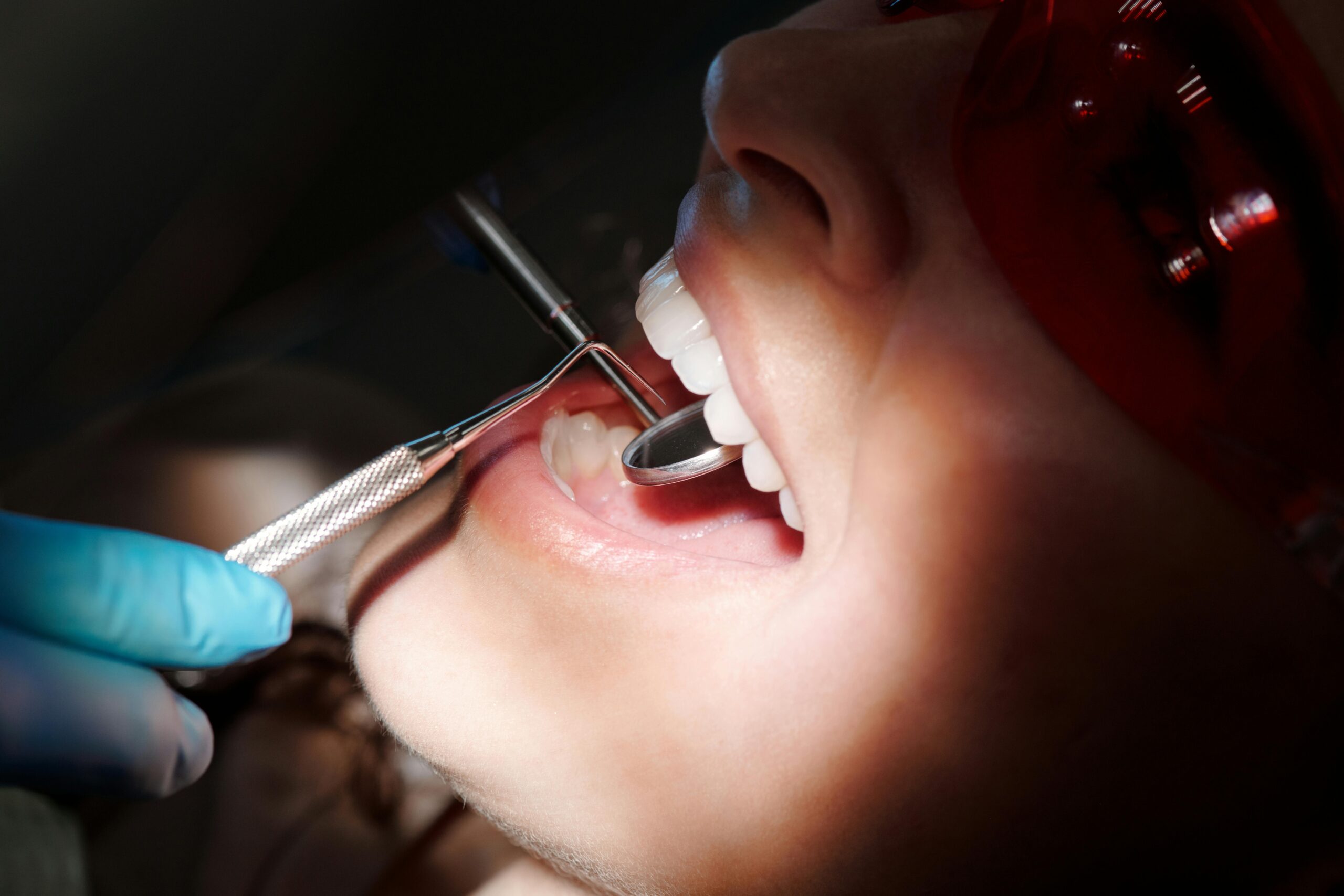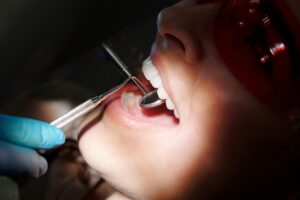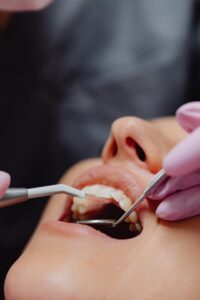スケーリング(歯石取り)ってどんなことをするの?
- 2025年10月7日
- コラム

こんにちは。新宿、西新宿、中野坂上の歯医者、TOKYO DENTAL OFFICE 西新宿でございます。

皆さまは「歯石取り(スケーリング)」を受けたことがありますか?
定期検診やクリーニングのときに行う処置ですが、
「痛そう」「なんのためにやるの?」と不安に思われる方もいらっしゃいます。
今回は、スケーリングがどんな治療なのか、なぜ必要なのかをわかりやすくご紹介いたします。
■ 歯石ってなに?
歯石とは、歯の表面に付着した「プラーク(歯垢)」が唾液中のカルシウムなどと結合して硬くなったものです。
一度歯石になると、歯ブラシでは落とすことができません。
そのまま放置すると歯ぐきに炎症を起こし、歯周病の原因になります。
■ スケーリング(歯石取り)とは
スケーリングは、専用の器具(スケーラー)を使って歯や歯ぐきの境目、歯と歯の間などにこびりついた歯石を取り除く処置です。
当院では、超音波の振動で歯石を効率よく落とす「超音波スケーラー」を使用しています。
歯を削るわけではありませんので、基本的に痛みは少なく安心して受けていただけます。
■ スケーリングの効果
・歯ぐきの腫れや出血の改善
・口臭の軽減
・むし歯・歯周病の予防
・歯の表面がつるつるになり、汚れが付きにくくなる
定期的に歯石を取り除くことで、お口の健康を長く保つことができます。
■ スケーリングの頻度
個人差はありますが、3〜6か月に1回の定期的なスケーリングがおすすめです。
歯石は日々の歯磨きだけでは完全に防げないため、定期的なプロケアで清潔な状態を保ちましょう。
🪥② 再評価って何?歯周病治療の流れを解説
歯石取りを行った後、「次は再評価をしますね」と言われたことはありませんか?
「再評価ってなにをするの?」と疑問に思う方も多いと思います。
■ 再評価とは?
再評価とは、歯周病治療の効果を確認するためのチェックのことです。
スケーリング(歯石除去)を終えた後、歯ぐきの炎症がどのくらい改善したか、歯周ポケットの深さがどれくらい減ったかなどを検査します。
■ なぜ再評価が必要なの?
歯石を取ったあとすぐは、歯ぐきがまだ回復途中のこともあります。
1〜2か月ほど経つと、炎症が落ち着き、歯ぐきの状態が安定してくるため、
再評価のタイミングで治療の成果を正確に判断できるようになります。
■ 再評価で確認する項目
・歯周ポケットの深さ
・出血の有無
・歯の動揺(ぐらつき)
・プラークの付着状況
・口腔内写真による比較 など
この結果をもとに、今後の治療方針を決めます。
状態が改善していれば「メンテナンス(定期検診)」へ、
改善が不十分な場合は「さらに詳しい歯周病治療」へ進むこともあります。
■ まとめ
スケーリングと再評価は、どちらも歯周病治療に欠かせない大切なステップです。
「歯石を取ったら終わり」ではなく、その後の状態を確認することが、再発を防ぐ第一歩です。
定期的なチェックで健康な歯ぐきを保ちましょう。
一般歯科、審美歯科、ホワイトニング、虫歯治療、根幹治療、痛みの少ない治療、抜歯、予防歯科、小児歯科、歯周病治療、かぶせ物

What is Scaling (Tartar Removal) and How Does It Work?
Understanding Re-evaluation in Periodontal Treatment
Hello! We are TOKYO DENTAL OFFICE Nishi-Shinjuku, serving Shinjuku, Nishi-Shinjuku, and Nakano-Sakaue.
Many people have heard of “scaling” or “tartar removal” during a dental check-up or cleaning, but some may wonder, “What exactly is it?” or “Does it hurt?” In this article, we will explain what scaling is, why it is important, and what “re-evaluation” means in periodontal treatment.
What is tartar? Tartar is hardened plaque that forms on the teeth when bacteria and leftover food combine with minerals in saliva. Once it becomes tartar, it cannot be removed by brushing alone. If left untreated, tartar can cause inflammation of the gums and lead to gum disease, which can eventually result in tooth loss.
What is scaling? Scaling is the professional removal of tartar from the surface of teeth and the gum line using specialized dental instruments called scalers. At our clinic, we often use an ultrasonic scaler that gently vibrates to remove tartar efficiently. This procedure does not damage the teeth and is generally painless, making it safe and comfortable for patients.
The benefits of scaling include improving gum health, reducing bleeding and swelling, preventing cavities and gum disease, reducing bad breath, and leaving teeth smooth so that plaque is less likely to stick. Regular scaling helps maintain long-term oral health.
How often should scaling be done? Individual needs vary, but a professional cleaning every 3–6 months is generally recommended. Plaque and tartar naturally build up over time, so periodic professional care is essential to keep your mouth clean.
What is re-evaluation? After scaling, your dentist may schedule a re-evaluation. Re-evaluation is a follow-up examination that checks how well your gums have healed and whether the treatment was effective. It is a key part of periodontal therapy.
Why is re-evaluation necessary? Immediately after scaling, the gums may still be recovering. Typically, 1–2 months after treatment, inflammation decreases and gum condition stabilizes, allowing the dentist to accurately assess the results.
During re-evaluation, the dentist will check the depth of gum pockets, presence of bleeding, tooth mobility, plaque accumulation, and may take photos to compare changes. Based on these findings, the dentist will decide on the next steps. If the gums are healthy, the patient may continue with regular maintenance visits. If further issues are present, additional periodontal treatment may be recommended.
Scaling and re-evaluation are essential steps in maintaining healthy gums. Removing tartar is not the final step; checking the condition of your gums afterward is the first step to preventing recurrence. Regular follow-ups help keep your gums and teeth healthy for years to come.
General Dentistry, Cosmetic Dentistry, Teeth Whitening, Cavity Treatment, Root Canal Therapy, Pain-Free Dentistry, Tooth Extractions, Preventive Dentistry, Pediatric Dentistry, Periodontal Treatment, Dental Crowns









